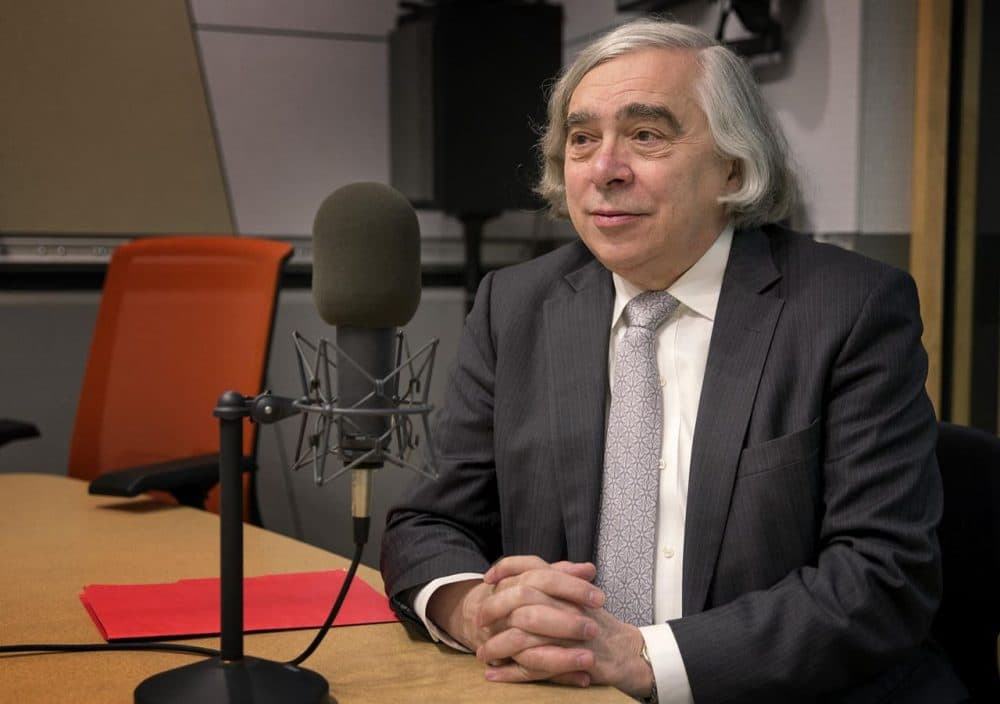Advertisement
Energy Secretary Discusses New Energy Bill And Future For Coal Workers

As early as next week, Congress is expected to pass the first comprehensive energy bill since 2007. It will be the first big energy legislation since the American energy landscape was dramatically reshaped by fracking, the controversial drilling technique which turned the U.S. into a leading oil and gas producer.
To reach an agreement, senators dropped controversial provisions on offshore drilling and lead-contaminated water. And, they focused on areas of common ground, such as energy infrastructure and improvements and energy efficiency. Here & Now's Peter O'Dowd talks with U.S. Energy Secretary Ernest Moniz about the bill.
Interview Highlights: Ernest Moniz
Energy bills don't come along quite often. What is your reaction to this one?
“The energy bill as it seems to be moving will have many very, very positive elements. It will really reinforce our commitment to energy technology and innovation, it will recognize our reorganization in terms of better integration of energy and science programs. It will recognize our increasing responsibilities in emergency response for energy infrastructure disruptions.”
The main idea of the bill seems to be the modernization of the energy grid, and of the transportation system for oil and gas. Talk about the need there.
“Well, what we see is a collection of risks that we need to look at together. For resilience of the grid in the 21st century, we have the expectation, unfortunately, of increasingly extreme weather. We have cyber risks that are growing, we have physical risks that we have seen demonstrated in parts of the country. We need to address this technologically. Storage, for example, would be a major new addition. But we also need to address the regulatory structures and the policy issues and, of course, companies must address business models.”
Peabody Energy, the country’s largest coal company, declared bankruptcy this week. What is your reaction to that news?
“Well, one thing, of course we recognize that there has been a dramatic shift from coal to natural gas in the electricity sector. I want to emphasize that that has largely been driven by market conditions, namely the very low price of natural gas. We predict the energy information administration predicts that, in 2016, it will be the first full year where natural gas has a larger share of electricity production than coal. As I say, when you look at natural gas prices, that has been a principal driver. It’s also led, by the way, to about a 15 percent reduction in CO2 emissions from the power sector since 2007.”
What do you say to the people who have lost their job because of the country’s shift away from coal during the Obama administration?
“Well, first of all, obviously we're very concerned about dislocation in the economy, specifically job losses. But, again, I want to emphasize we really need to keep the issues straight. The principle shift from coal is market driven by natural gas prices. The impact has been much bigger on coal and nuclear than it has been on renewables growth in the country. The Clean Power Plan is very important for our meeting the lower carbon future that we need, but I remind you it comes into effect in 2022. What we are seeing now in these dislocations is, again, principally market driven. Finally, I will say that we continue to invest billions of dollars in trying to establish a technology called carbon capture and sequestration that would allow coal use in the future in a low carbon world.”
Where do the tens of thousands of people who've lost their jobs find work?
"Well, the Obama administration has put a program forward called POWER Plus that is specifically aimed at helping displaced workers. Ultimately, it's about retraining, it's about more economic development, it's about other opportunities. All we can do is work with the states, work with the governors, work with the localities to try to minimize the effects of those dislocations. Any time there is a major shift, clearly there are issues of workers. We are very committed to doing all that we can to help them."
Will notable accomplishments from the Obama administration, from the Clean Power Plan to the Paris Agreement, be in jeopardy come November?
“I expect that we will, no matter who's elected, obviously if a Democrat is elected given the discussions in the campaign, we would fully expect strong, very strong support. Republicans in the campaign have made less assuring statements, shall we say. But I believe public opinion is clearly shifting towards recognizing the importance of addressing climate change and I firmly believe that we are going to see, within a relatively small number of years, congressional legislative actions to address climate change in an economy-wide approach. The president, when he announced the Climate Action Plan, he first said we would love to work with Congress in getting a legislative solution. In the absence of that, however, we can’t wait and we will move forward by exercising the executive authorities sector by sector.”
Guest
- Ernest Moniz, nuclear physicist and U.S. secretary of energy in the Obama administration. He tweets @ErnestMoniz.
This segment aired on April 15, 2016.